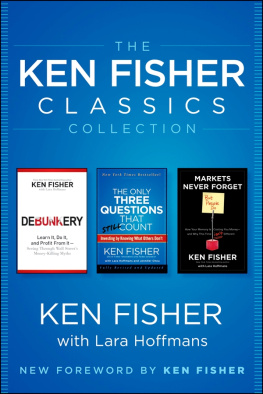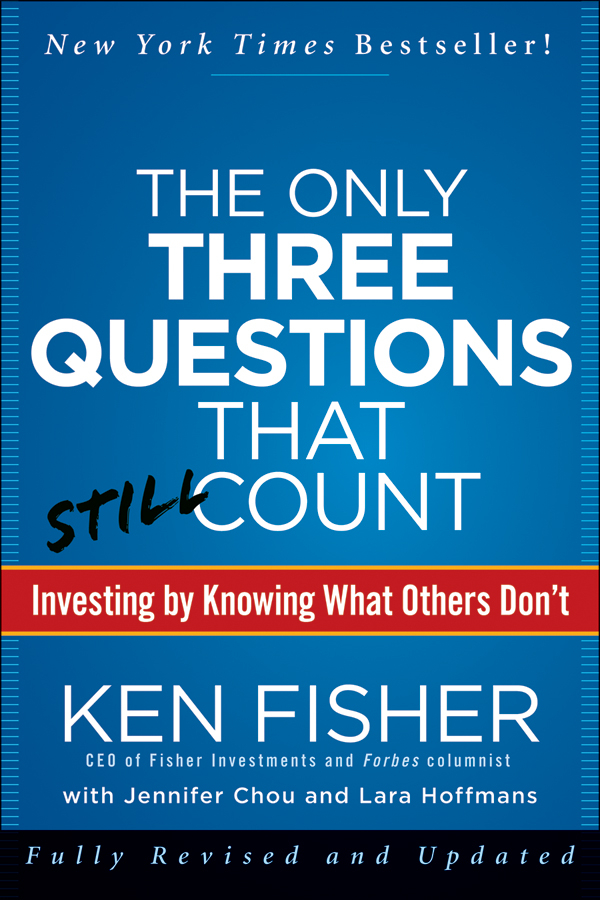CONTENTS

Copyright 2012 by Fisher Investments. All rights reserved.
This book is a revised edition of The Only Three Questions That Still Count: Investing By Knowing What Others Dont published by John Wiley & Sons, Inc., 2007
Published by John Wiley & Sons, Inc., Hoboken, New Jersey.
Published simultaneously in Canada.
No part of this publication may be reproduced, stored in a retrieval system, or transmitted in any form or by any means, electronic, mechanical, photocopying, recording, scanning, or otherwise, except as permitted under Section 107 or 108 of the 1976 United States Copyright Act, without either the prior written permission of the Publisher, or authorization through payment of the appropriate per-copy fee to the Copyright Clearance Center, Inc., 222 Rosewood Drive, Danvers, MA 01923, (978) 750-8400, fax (978) 646-8600, or on the Web at www.copyright.com . Requests to the Publisher for permission should be addressed to the Permissions Department, John Wiley & Sons, Inc., 111 River Street, Hoboken, NJ 07030, (201) 748-6011, fax (201) 748-6008, or online at http://www.wiley.com/go/permissions .
Important Disclaimers: This book reflects personal opinions, viewpoints and analyses of the authors and should not be regarded as a description of advisory services provided by Fisher Investments or performance returns of any Fisher Investments client. Fisher Investments manages its clients accounts using a variety of investment techniques and strategies not necessarily discussed in this book. Nothing in this book constitutes investment advice or any recommendation with respect to a particular country, sector, industry, security or portfolio of securities. All information is impersonal and not tailored to the circumstances or investment needs of any specific person.
Limit of Liability/Disclaimer of Warranty: While the publisher and author have used their best efforts in preparing this book, they make no representations or warranties with respect to the accuracy or completeness of the contents of this book and specifically disclaim any implied warranties of merchantability or fitness for a particular purpose. No warranty may be created or extended by sales representatives or written sales materials. The advice and strategies contained herein may not be suitable for your situation. You should consult with a professional where appropriate. Neither the publisher nor author shall be liable for any loss of profit or any other commercial damages, including but not limited to special, incidental, consequential, or other damages.
For general information on our other products and services or for technical support, please contact our Customer Care Department within the United States at (800) 762-2974, outside the United States at (317) 572-3993 or fax (317) 572-4002.
Wiley also publishes its books in a variety of electronic formats. Some content that appears in print may not be available in electronic books. For more information about Wiley products, visit our web site at www.wiley.com .
ISBN 978-1-118-11508-4; ISBN 978-1-118-22421-2 (ebk); ISBN 978-1-118-23755-7 (ebk); ISBN 978-1-118-26246-7 (ebk)
PREFACE
Who Am I to Tell You Something That Counts?
Who am I to tell you anything, much less anything that counts? Or that there are only three questions that count and I know what they are? Why should you bother reading any of this? Why listen to me at all?
As I update this book in 2011 for its second edition, Ive been in the investment industry for nearly 40 years. I founded and am CEO of what is among the worlds largest independent discretionary money management firms, serving tens of thousands of high net worth individuals and an impressive roster of institutionsmajor corporate and public pension plans and endowments and foundationsspanning the globe. Ive written Forbess Portfolio Strategy column for over 27 years, making me the fourth longest-running columnist in Forbess long history. I write regular columns in Britain and Germany. And now, Ive written eight books, five of which (including this one) were national bestsellers. Along the way, and without really aiming at it, I made the Forbes 400 list of richest Americans.
Thats a lot for one lifetime and one professional career. But Im here to tell you the prime cumulative lesson of my long career is when it comes to investing, there are only three questions that count. And my view on that hasnt changed since I first penned this book.
In reality, there really is only one question that counts. Or, at least, only one question that really counts. But I dont know how to express that one question in a way you can easily use for everyday investing decisions. If broken down into three subparts, I know how.
And what is that only question that counts? Finance theory is quite clear the only rational basis for placing a market bet is if you believe somehow, some way, you know something others dont know. The only question that counts is: What do you know that others dont?
Most people dont know anything others dont. Most folks dont think theyre supposed to know something others dont. Well see why. But saying you must know something others dont isnt at all novel. Pretty much everyone who took a basic college investment class was told this, although most people conveniently forget this truism.
Without answering the questionwhat do you know that others dontinvesting with an aim to do as well or better than the market is futile. Ill say that another way. Markets are pretty efficient at pricing all currently known information into todays prices. There is nothing new about that statement. Its an established pillar of finance theory and has been repeatedly verified over the decades. If you make market decisions based on the same information others have (or have access to), you will overall fail relative to what the markets would have rendered you on their own without any decision making on your part. If you try to outguess where the market will go or what sectors will lead and lag or what stock to buy based on what you read in newspapers or chatter about with your friends and peersit doesnt matter how smart or well trained you areyou will sometimes be right or lucky or both, but likely more often wrong or unlucky or both, and overall do worse than if you didnt make such bets at all.
I bet you hate hearing that. But I already told you I didnt know how to express that truism as a single question in a way useful to you. What I can do is show you how to know things other people dont know.
Polling for Perfect Truth
Why is knowing something others dont so important? Financial markets are discounters of widely known informationwhatever information we commonly have access to has already been reflected in todays prices before we can articulate our knowledge of it. See it this waycompare markets to political elections that arent discounters of known information.
You know professional pollsters can build a sample of about 1,000 people sufficiently representative of Americas voters to foresee the immediate outcome of a national election within a predictable few percentage points. That technology is mature and time-tested. Youre quite used to it. When a professional poll is done the night before the election, we know within maybe three to five percentage points how the election will end. Its all based on picking the participants in the poll to be representative of total votes.
Envision if someone could build a similar sample of all the worlds investors. It would include every imaginable type in just the right proportions. Institutional and retail. Growth and value fans. Small and big cap. Foreign and domestic. Whatever imaginable. Suppose the pollsters polled the sample and suppose the consensus view was the market would rise next monthbig time. Could it? No, because if everyone tended to agree the market would rise next month, anyone with any buying power would buy before then. The market might rise before next month, but only a fool would wait for next month to buy. Hence, next month there would be no subsequent buying power to drive the market higher. It could fall. It could stay flat. But it couldnt rise much. This is an oversimplification, but its a useful illustration of how whatever we agree on has already been priced into the markets by the time we can articulate it, and, therefore, it cant occur. Since investors tend to be avid information seekers, the information they have access to has already been priced into the bets theyve made.






